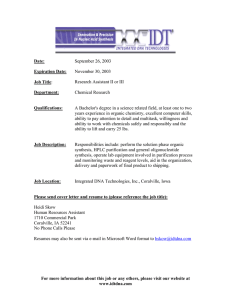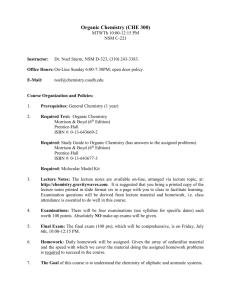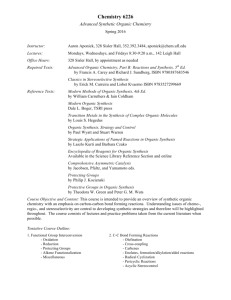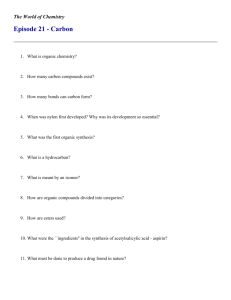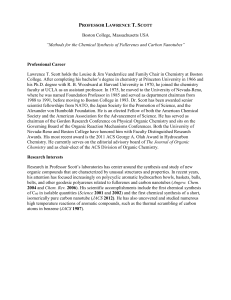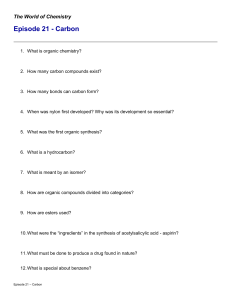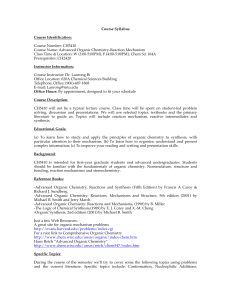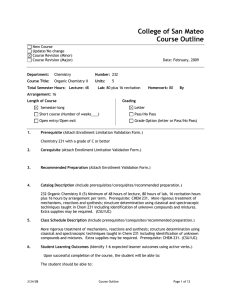chem 26: organic chemistry laboratory
advertisement
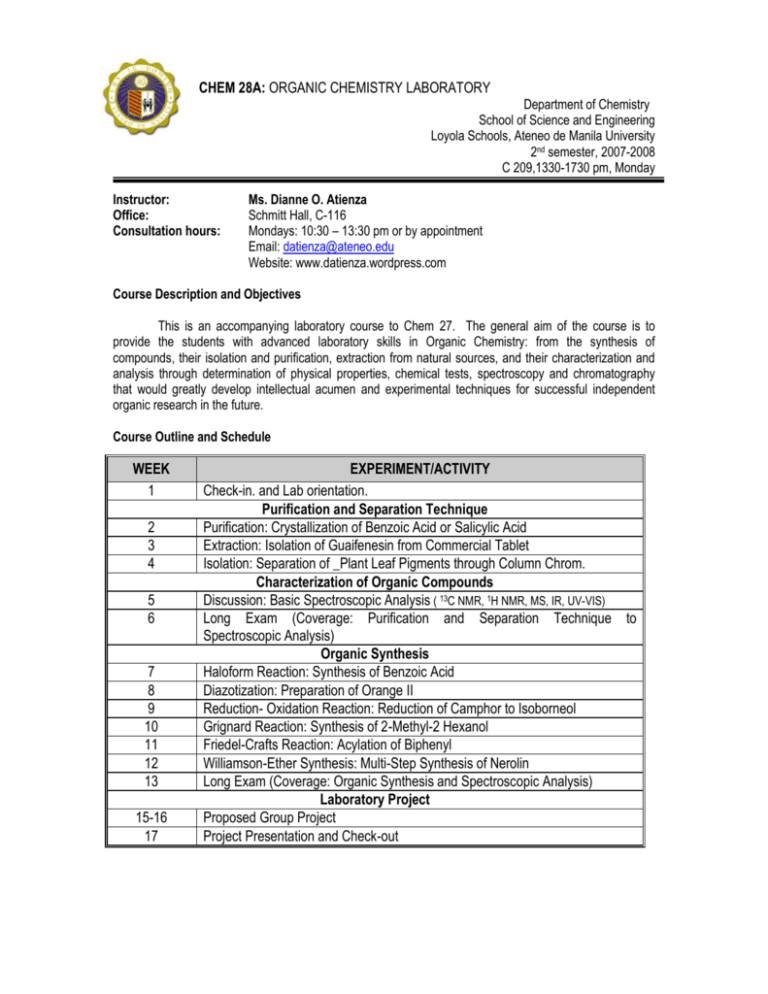
CHEM 28A: ORGANIC CHEMISTRY LABORATORY Department of Chemistry School of Science and Engineering Loyola Schools, Ateneo de Manila University 2nd semester, 2007-2008 C 209,1330-1730 pm, Monday Instructor: Office: Consultation hours: Ms. Dianne O. Atienza Schmitt Hall, C-116 Mondays: 10:30 – 13:30 pm or by appointment Email: datienza@ateneo.edu Website: www.datienza.wordpress.com Course Description and Objectives This is an accompanying laboratory course to Chem 27. The general aim of the course is to provide the students with advanced laboratory skills in Organic Chemistry: from the synthesis of compounds, their isolation and purification, extraction from natural sources, and their characterization and analysis through determination of physical properties, chemical tests, spectroscopy and chromatography that would greatly develop intellectual acumen and experimental techniques for successful independent organic research in the future. Course Outline and Schedule WEEK 1 2 3 4 5 6 7 8 9 10 11 12 13 15-16 17 EXPERIMENT/ACTIVITY Check-in. and Lab orientation. Purification and Separation Technique Purification: Crystallization of Benzoic Acid or Salicylic Acid Extraction: Isolation of Guaifenesin from Commercial Tablet Isolation: Separation of _Plant Leaf Pigments through Column Chrom. Characterization of Organic Compounds Discussion: Basic Spectroscopic Analysis ( 13C NMR, 1H NMR, MS, IR, UV-VIS) Long Exam (Coverage: Purification and Separation Technique to Spectroscopic Analysis) Organic Synthesis Haloform Reaction: Synthesis of Benzoic Acid Diazotization: Preparation of Orange II Reduction- Oxidation Reaction: Reduction of Camphor to Isoborneol Grignard Reaction: Synthesis of 2-Methyl-2 Hexanol Friedel-Crafts Reaction: Acylation of Biphenyl Williamson-Ether Synthesis: Multi-Step Synthesis of Nerolin Long Exam (Coverage: Organic Synthesis and Spectroscopic Analysis) Laboratory Project Proposed Group Project Project Presentation and Check-out Course Requirements Requirements Pre-lab Reports Post-lab Reports Project proposal Project product and presentation Lab performance Quizzes, Seatworks Points/ experiment 10 pts. 100 pts. 50 pts. 100 pts. 20 pts. ~ 100 pts. Prelab reports must be handwritten in the standard notebook provided by the stockroom and must be passed before the start of the experiment. All data must be written directly in your lab notebook. Post-lab reports must be type-written and passed during the next laboratory period. Read the Laboratory Safety and Guidelines Grading System Grading is by point system; earn as many points as you can. The final grade is equivalent to the number of points earned over the number of points at stake. LETTER GRADE A B+ B C+ C D F NUMERICAL EQUIVALENT ≥ 92 87 – 91 80 – 86 75 – 79 68 – 74 60 – 67 BELOW 60 Classroom Policies NO Pre-lab, NO Lab Post-lab reports submitted after the due date are 25% discounted in per day basis. A missed laboratory session will be compensated by a postlab report and discussion but 50% discounted, also a zero grade for the lab performance in that experiment. No make-up session will be given. Students late for 15 minutes or missing the prelab discussion will get a 5-point deduction from the lab performance and “absent” mark for students coming after 30 mins. Incomplete Post-lab reports by the end of the semester will be given an INCOMPLETE final grade. Dishonesty (e.g. cheating, false data, plagiarism, etc.) is major offense. Should thre be evidence that dishonesty has been committed, the maximum penalty allowed by the university will be pursued. The student handbook allows two (2) cuts, excused or unexcused. A missed laboratory session will mean a grade of zero for the activity except for cuts due to serious illness or school-required engagements. An OFFICIAL document must be submitted to the instructor upon the student’s return. Laboratory Manual: Experiencing Organic Chemistry by Guidote, A., del Rosario, D. and Abuzo, A. References Experimental Organic Chemistry by Clark F. Most, Jr. Techniques and Experiments for Organic Chemistry; Fessenden, R.J., Fessenden, J.S.
